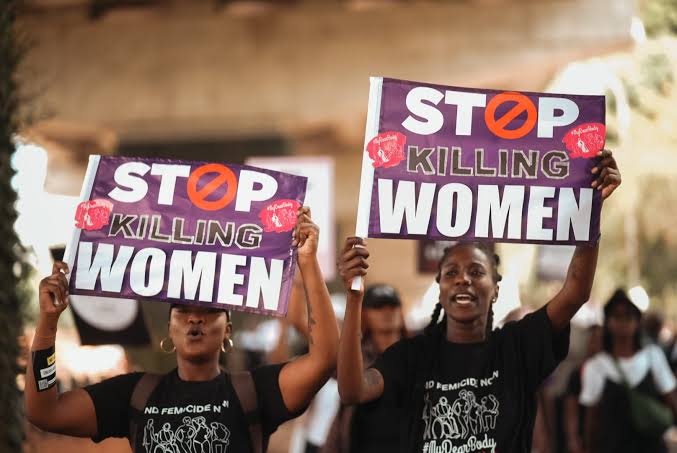The global scourge of femicide has escalated to crisis levels, with Nigeria bearing a disproportionate burden. A chilling statistic underscores the severity of this issue: approximately one woman is killed every 10 minutes worldwide, highlighting the urgent need for collective action to address this devastating trend.
According to the Oxford Dictionary, femicide is defined as the killing of a woman or girl, typically by a man or in a domestic setting.
Nigeria has witnessed a disturbing surge in femicide cases, with 13 incidents reported in January 2025 alone. This represents a significant increase from the nine cases recorded in September 2024 and 12 in October 2024.
The most recent case is the tragic incident that occurred in Bauchi State, on March 1, 2025, the first day of fasting where a 24-year-old housewife reportedly lost her life after being physically assaulted by her 50-year-old husband during an altercation over preparations for a Ramadan meal.
The incident occurred at about 11:30 pm in the Fadamam Mada area, near Government Girls College, Bauchi, Persecondnews gathered.
Alhaji Nuru Isah, a businessman at Bauchi Central Market, allegedly assaulted his second wife, Wasila Abdullahi, during a heated argument over food ingredients and fruits intended for their Ramadan fast-breaking meal.
The altercation escalated, and Isah allegedly struck Wasila with a big cane, and in the process she collapsed and lost consciousness in their home.
Other notable cases involved Christianah Idowu, a 21-year-old student of Pure and Applied Botany at the Federal University of Agriculture, Abeokuta. She was abducted and murdered by her friend, Ayomide Adeleye, who had previously been accused of killing his ex-girlfriend. Non-intimate partner violence was identified as the primary cause of many reported femicide cases.
Also, Damilola Olowoyo, a 19-year-old first-year student at the Federal University, Lokoja, lost her life under horrific circumstances. On September 4, 2024, Jeremiah Paul, who had feigned romantic interest in her, lured Damilola to her death.
He allegedly spiked her drink with codeine, then brutally strangled her. Following her murder, Jeremiah mutilated Damilola’s body, removing several organs. The motive behind this heinous act is suspected to be ritualistic in nature.
Habibat Akinsanya, an 18-year-old girl who had been reported missing late 2024, was found dead on her father’s farm in Obasa, Mile 6, along Ajebo Road, in Abeokuta, Ogun State.
The suspect, 29-year-old Ogunnaike Philip, was alleged to have killed Habibat, and is also suspected of being involved in the murders of 22-year-old Abigail Dina and 23-year-old Mary Ogunyemi.
Recently, in January 2025, precisely, a gruesome murder occurred in Orozo, Nasarawa State, where 24-year-old Salome Eleojo Adaidu was killed.
The suspect, Timileyin Ajayi, who claimed to be a “gospel singer,” was arrested with the victim’s severed head near a church, and further investigation revealed that he had dismembered her body into 50 pieces at his residence.
Also, in January 28, 2025, a 21-year-old TikTok star, identified as Rachel, allegedly died from poisoning, with her boyfriend, upcoming Nigerian musician Og1 Savage, being a prime suspect of the crime.
According to reports, Rachel had visited Og1 Savage to collect a phone he had promised her, and it is also alleged that she was pregnant with his child at the time of her death.
In the same January, a horrific incident occurred at Abagana community in the Njikoka Local Government Area of Anambra State, where a middle-aged woman, Mrs. Chioma Nwana, was allegedly set on fire by her husband over accusations of infidelity.
Persecondnews recalls in February 2025, that Yetunde Lawal, a 23-year-old final-year student of the Kwara State College of Education in Ilorin, was murdered and dismembered by Islamic cleric Abdulrahman Bello.
These cases represent only a fraction of the actual occurrences, as research suggests that for every reported incident of femicide, there are approximately three that go unreported.
Against these backdrop, the Nigeria Police, several agencies and other stakeholders have implemented measures to mitigate and strengthen its response to Gender-based Violence(GBV), homicidal and femicide acts.
Sequel to this, the Nigeria Police Force, on February 15, 2025, announced the establishment of GBV desk offices at all divisional headquarters nationwide.
Persecondnews recalls that the GBV desk offices are previously limited to zonal and state commands.
The expansion, according to Force Spokesperson ACP Olumuyiwa Adejobi, will ensure that cases of gender-based violence receive prompt and professional attention at the grassroots level.
Adejobi said: “This initiative aims to enhance efficiency, improve service delivery, and ensure easier access to justice for citizens.
“To support this expansion, the IGP has mandated the appointment of qualified officers as GBV desk officers. These officers will undergo specialized training to equip them with the necessary skills, knowledge, and expertise to handle GBV cases effectively.
“Additionally, divisional GBV desk officers will now oversee the Juvenile, Women, and Children (JWC) section in their divisions.”
Lending their voice to the growing menace, the House of Representatives on February 18, 2025, called on relevant Federal Government agencies to implement tough measures against homicidal and femicidal acts in Nigeria.
The lawmakers alluded to the fact that the right to life is a fundamental human right guaranteed by the Constitution, while homicide cases, including murder, manslaughter, and other violent crimes leading to the termination of life, have been on the rise across the country, provoking public demand for justice.

In an exclusive interview with Persecondnews in Abuja, the Publicity Secretary of the International Federation of Women Lawyers (FIDA), Nigeria-Abuja Branch, Chimdindu Onyedim-Etuwewe, said Nigeria does not yet have a specific law on femicide.
Onyedim-Etuwewe lamented that femicide cases are typically prosecuted under general homicide laws, as outlined in the Criminal Codes and Penal Codes, rather than being addressed through specific legislation tailored to gender-based violence.
The lack of specific legislation, according to Onyedim-Etuwewe, hinders effective action against femicide, as these cases are frequently handled as regular homicides, overlooking the underlying gender-based violence.
She assured that efforts are underway to address the issue, with growing calls for a dedicated femicide law that specifically targets gender-motivated killings.
According to Onyedim-Etuwewe, FIDA has been actively combating femicide and other forms of gender-based violence by collecting data through various channels and providing pro bono services to victims, offering them critical support and advocacy.
She credited social media for amplifying cases of gender-based violence (GBV) and raising awareness about these issues.
Femicide cases, she said frequently occur within domestic environments, with specific regions exhibiting higher rates due to entrenched cultural and societal factors.
She said: “FIDA provides comprehensive support to survivors of domestic violence, including pro-bono legal services, psychosocial counseling, temporary shelter, and emergency interventions, while also conducting community outreach programs to promote prevention and awareness.
“Nigeria’s justice system is hindered by inefficiencies, bureaucratic delays, and a backlog of cases, which slow the prosecution of femicide cases, prevent survivors and families from achieving closure, and erode public trust.
“We advocate for legislative reforms to protect women from gender-based violence, we recently pushed for amendments to the Violence Against Persons Prohibition Act to increase penalties for female genital mutilation.
“We collaborate with various stakeholders to amplify its advocacy against gender-based violence, and recommends that the Nigerian government prioritize improved law enforcement training and judicial processes, while civil society and individuals continue to support survivors and advocate for women’s rights.”
Decrying the sharp rise of femicide in Nigeria, the Executive Director of Gender Strategy Advancement International, Adaora Onyechere Sydney Jack, said in an exclusive interview with Persecondnews on Thursday, February 21, that thirteen cases of femicide were reported in Nigeria in January alone.
These incidents, according to her, were reported in the following states: one in Abuja, Ekiti, Lagos, and Nasarawa, while Anambra, Delta, and Ogun State each recorded three.

Adaora said non-intimate partner violence accounted for the highest reported cases (76.9%), followed by domestic violence (15.4%), and unknown cases (7.7%) where the victim was found dead.
She said intimate partner violence affected women of unknown ages, while non-intimate partner violence impacted women and girls between the ages of 21 and 74.
“In 2018, one in every seven women (13 per cent of women aged 15 to 49) reported experiencing physical and sexual violence from an intimate partner or husband in the preceding 12 months.
“In Nigeria, an average of 300–350 women are killed every year by their husbands, former partners, boyfriends, or male relations.
“Most times, these incidents are considered family feuds, which should be handled within the family, leading to significant underreporting.
Often times, police refuse to intervene and advice the victims to go back home and settle “family matters”, she lamented.
Adaora said that deeply ingrained patriarchal norms and inequality, particularly in countries like Nigeria, significantly contribute to the alarming rise in femicide globally.
She expressed concern that as Nigeria approaches the halfway mark to achieving the 2030 Agenda for Sustainable Development, the country remains far from attaining SDG 5, which focuses on achieving gender equality and empowering women and girls.
She said: “We need to continue to create a culture where women are secure and valued by by empowering them to take independent financial responsibility to avoid forced economic dependency.
“We must continue to speak up against femicide and ensure that our outrage translates to actions and implementation of policies that promote the safety of women all over the world.
“Nigeria’s low conviction rate in femicide cases, coupled with the lack of a specific femicide law, has resulted in inadequate justice for women and underscores the urgent need for comprehensive legislation.
“Power imbalances between victims and offenders, often rooted in their relational dynamics, pose a significant challenge to restorative justice, risking the perpetuation and intensification of abuse patterns.
“Despite potential challenges, the thoughtful application of restorative justice in femicide cases can facilitate rehabilitation, deterrence, and victim empowerment by providing a safe space for survivors to confront their aggressors and have their voices heard.
“Restorative justice encounters provide a non-judgmental space for open dialogue and healing, prioritizing the needs and closure of survivors, as well as the families of deceased victims.”
Giving insight into Islamic views on the sanctity of marriage, femicide, and GBV, Dr. Malami Muhammad Garba, Head of the Islamic Studies Department and Imam of the Modibbo Adama University Mosque, FCE Yola, said in an exclusive interview with Persecondnews on telephone that in Islam, marriage is considered one of the fundamental social institutions.
Garba attributed the surge in domestic violence in Nigeria to the growing trend of individuals entering marriages driven by self-interest rather than genuine love and devotion to their partners and faith.
He advised parents and guardians of couples to be vigilant, identify potential issues early, and intervene promptly to prevent conflicts from escalating.
Garba also advised husbands to fulfill their marital responsibilities, including providing for their wives’ basic needs, protecting their dignity, and ensuring their well-being.
He equally urged wives to show love and respect towards their husbands, care for their children, and maintain fidelity.
According to Garba, the government should intensify its efforts against femicide and safeguard the lives of vulnerable individuals.
He advocated stricter punishment and enforcement against perpetrators, stressing that harsher penalties would serve as a deterrent to others from committing similar crimes.
Garba also urged the National Orientation Agency (NOA) to help raise awareness against femicide and GBV while advising Muslim and Christian leaders to play their part in combating domestic violence by preaching against it during their sermons.
Pst. Taymesan Oburo of Righteousness Abound Ministry strongly denounced femicide and gender-based violence, emphasizing that God utterly detests violence and the shedding of innocent blood, and that such acts are an affront to His divine nature.
Oburo told Persecondnews that while the church does not condone divorce, it does advocate for separation in cases where domestic violence is present.
He said: “The bible condemns all forms of violence, including femicide and GBV. In fact, scripture is full of condemnations of violence, associating it with wickedness and labeling it “detestable to the Lord” (Psalm 11, Proverbs 3 & 10).
“Regarding violence against women, the Bible views rape as equivalent to murder (Deut 22:26) and pressuring a woman into sex, either physically (Deut 22:25–27) or psychologically (Deut 22:28–29), as equally reprehensible.
“It also tells stories of horrific sexual abuse of women, such as the rapes of Dinah, Tamar, and the woman of Bethlehem. These acts are described as “outrages” (nebalah), a term reserved for extreme acts of violation against God and human beings.
“In terms of justice, the Bible emphasizes God’s hatred for evil and his commitment to punishing evildoers.”
Oburo counselled individuals experiencing domestic violence in the hands of their spouses to seek professional help and temporarily leave the marriage to ensure their safety.
He also urged the government to intensify its efforts in combating femicide and gender-based violence, expressing concern that such cases often go unpunished and are swept under the carpet.
As the conversation around femicide and gender-based violence continues to gain momentum, it is clear that a collective effort is needed to eradicate this surge.
The voices of FIDA, GBV advocates, and religious leaders underscore the importance of raising awareness, supporting survivors, and pushing for policy changes that prioritize the safety and well-being of women and girls.
It is, therefore, imperative that the Nigerian government continues to amplify the voices of those affected and work towards creating a society that values and protects the lives of all individuals.























Leave a comment